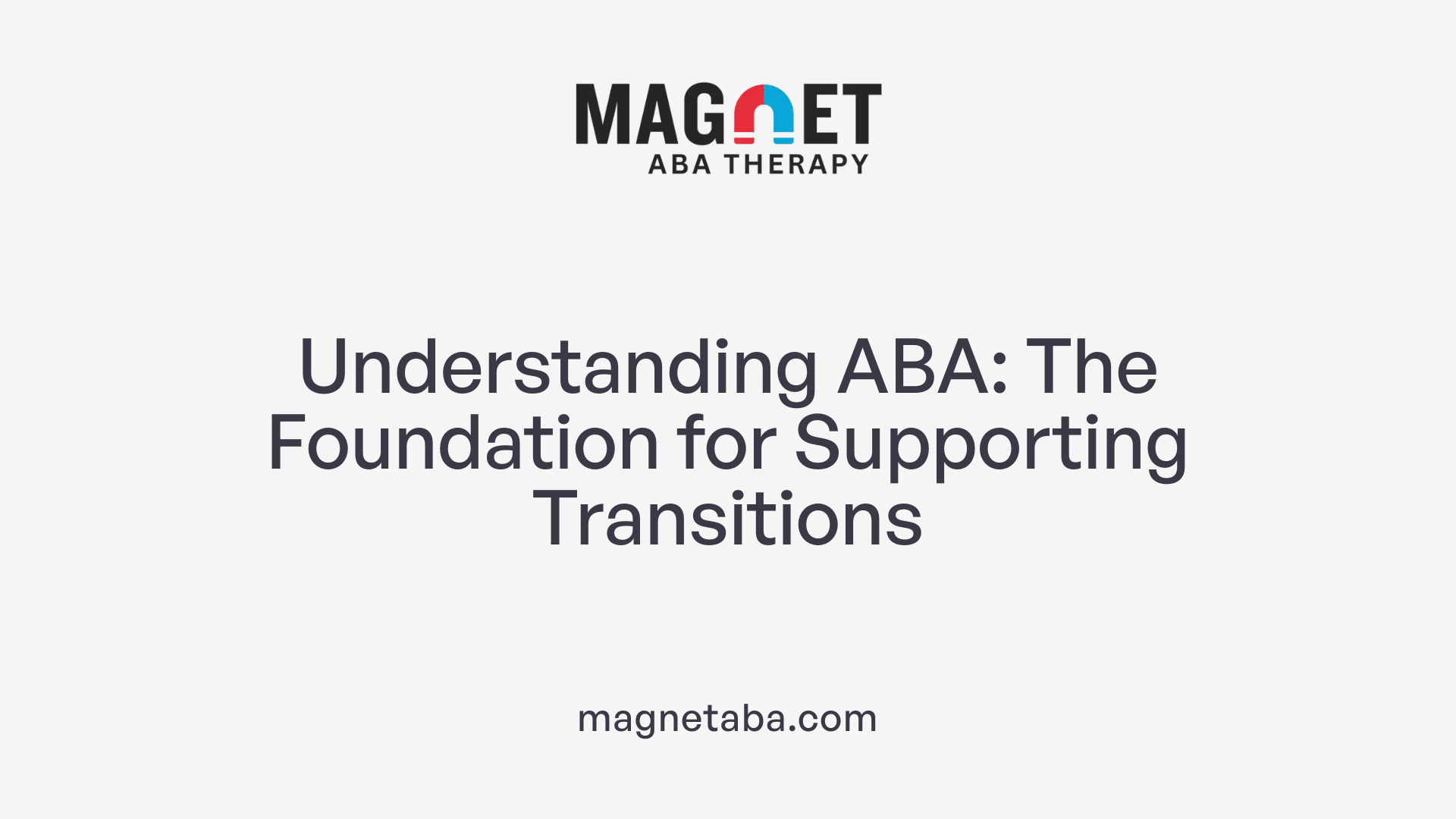Navigating the Path to Adulthood with ABA
As children with autism spectrum disorder (ASD) approach adulthood, the transition presents unique challenges and opportunities. Applied Behavior Analysis (ABA), a science-based therapy focusing on behavior modification and skill development, plays a pivotal role in supporting these individuals through this critical phase. This article explores how ABA principles facilitate successful transitions, addressing both skill acquisition and systemic support frameworks.
Understanding ABA and Its Role in Supporting Transitions

What is ABA Therapy?
Applied Behavior Analysis (ABA) is a science-based therapy focusing on analyzing and modifying behavior to help individuals with Autism Spectrum Disorder (ASD). It involves studying a child's functional challenges carefully to develop structured behavioral plans aimed at improving social, communication, learning, and adaptive skills while reducing problematic behaviors.
What Are the Core Principles of ABA?
The foundational principle of ABA therapy is positive reinforcement. This means rewarding desired behaviors to encourage their repetition. Through systematic observation and intervention, ABA increases meaningful behaviors in everyday settings.
Which Techniques Does ABA Use?
ABA employs evidence-based techniques such as modeling, where behaviors are demonstrated for imitation, and the Picture Exchange Communication System (PECS), which aids communication through picture symbols. These methods help children learn new skills effectively.
How Does ABA Improve Communication, Social, and Adaptive Skills?
ABA focuses on strengthening vital life skills. By teaching tailored social skills such as role-playing and using social stories, children learn how to understand social cues, interact appropriately, and build relationships. Adaptive skills like self-care and independence are developed via personalized assessments and targeted programs.
What Are Functional Communication Training (FCT) and Social Skills Training?
Functional Communication Training (FCT) replaces problematic behaviors with effective communication techniques, empowering children to express needs more appropriately. Social skills training uses interactive strategies like role-playing to enhance the child's ability to engage socially, facilitating smoother transitions across various life stages.
Building Adaptive Life Skills for Adult Independence

ABA’s use in developing self-care and independence
Applied Behavior Analysis (ABA) plays a crucial role in helping individuals with autism develop essential life skills needed for greater independence. Through systematic strategies, ABA supports learning self-care tasks such as dressing, grooming, and managing daily routines, which are foundational for adult autonomy.
Functional Skills Assessments (FSAs)
Functional Skills Assessments are integral to understanding each individual's unique abilities and challenges. FSAs provide detailed evaluations of key adaptive skills, guiding clinicians in creating effective intervention plans tailored to the specific needs of clients.
Tailored, personalized treatment plans
ABA therapy emphasizes personalized treatment approaches based on ongoing assessment results. Each plan is customized to target behaviors and skills that will maximize functional independence, ensuring progress in areas critical for daily living and social integration.
Collaboration with parents and caregivers
Successful ABA interventions rely on strong collaboration with parents and caregivers. Their involvement ensures consistency across settings and promotes generalization of learned skills outside therapy sessions, sustaining progress toward independence.
Progress tracking through ongoing assessment and data collection
Continuous data collection and analysis are fundamental in ABA to monitor the effectiveness of interventions. This ongoing assessment allows therapists to adjust strategies promptly, ensuring that treatment remains responsive to changing needs and consistently drives skill development toward adult autonomy.
Addressing Co-Occurring Conditions During Transition

What Co-Occurring Conditions Are Common in Autistic Individuals?
Children with autism often face additional challenges like ADHD, anxiety, insomnia, intellectual disabilities, and depression. These conditions can complicate the overall care and require a comprehensive treatment approach tailored to each individual's needs.
How Are These Conditions Managed Alongside Autism?
Managing co-occurring conditions involves a blend of behavioral interventions, psychotherapy, and sometimes medication. Therapies focus on improving functional skills and emotional regulation, while medications can help address symptoms that behavioral methods alone cannot fully control.
What Role Do Medications Play?
Certain FDA-approved medications, such as aripiprazole and risperidone, are specifically used to reduce irritability associated with autism. These are prescribed when behavioral interventions aren’t sufficient to manage these symptoms.
Why Is Coordination with Healthcare Providers Important?
Successful management requires close coordination among healthcare providers, therapists, families, and caregivers. This teamwork ensures that both autism and any co-occurring conditions are addressed holistically, with careful monitoring and adjustments in treatment plans.
How Does ABA Therapy Fit Into This Picture?
ABA therapy remains a central component by systematically addressing behavioral challenges and teaching adaptive skills. It often complements other interventions by providing structured support that improves communication and social interaction, forming a foundation that enhances the effectiveness of treatments for co-occurring conditions.
The Importance of Access and Quality Control in ABA Services

Indiana Medicaid’s history with ABA since 2016
Indiana began covering Applied Behavior Analysis (ABA) therapy under Medicaid in 2016, significantly expanding access for children with autism. Since then, state policies and expenditures have evolved to manage this vital service.
Current expenditure trends and their impact
Expenditures on ABA therapy peaked at $611 million in 2023 but declined to $445 million in 2024 due to lowered reimbursement rates and newly imposed service limits. These changes aim to control costs but also raise concerns about maintaining service availability and quality.
Provider growth and distribution
With over 320 ABA therapy locations statewide, Indiana saw a 25% growth in providers between 2023 and 2025. This expansion highlights the urgent need for quality assurance and dependable access across both urban and underserved areas.
Need for provider accreditation and quality oversight
To improve outcomes, the Indiana Family and Social Services Administration (FSSA) is proposing measures to accredit ABA providers and enhance oversight. These include increased monitoring and ensuring providers meet professional standards to improve service quality.
Issues with improper billing, documentation, and credentials uncovered by audits
A federal audit revealed significant issues in Indiana’s ABA program, including poor documentation, inadequate staff credentials, incorrect referrals, and improper billing. These findings underscore the need for stronger oversight and corrective actions to prevent improper payments.
Challenges with reimbursement rates and private insurance disparities
More than half of private insurance plans in Indiana reimburse ABA providers at rates below Medicaid levels. This disparity creates incentives for providers to prioritize Medicaid-covered children, complicating equitable access and straining resources.
Indiana’s approach to managing ABA therapy balances expanding access, controlling costs, and ensuring high-quality care. The state’s ongoing reforms reflect efforts to provide sustainable, effective ABA services that meet the needs of children with autism and their families.
Policy Approaches to Sustainable ABA Service Delivery

Indiana Family and Social Services Administration’s Proposed Medicaid Modifications
The Indiana Family and Social Services Administration (FSSA) is actively working to improve both cost management and service quality within the state's Medicaid program for ABA therapy. Recent proposals include modifications to the Medicaid State Plan designed to better control expenditures while ensuring children continue to receive necessary care.
4,000-Hour Lifetime Allocation for ABA Services
A significant part of these proposed changes is the introduction of a lifetime allocation of 4,000 hours for ABA therapy per child. This allocation aims to provide a clear limit that manages resources effectively without abrupt interruptions in therapy. By setting this cumulative cap, Indiana seeks to balance the demand for services with sustainable funding.
Proposed, Then Withdrawn, Caps on Weekly Treatment Hours
Previously, the state considered restricting weekly ABA therapy to 30 hours for a duration of three years. However, this plan was withdrawn after concerns surfaced about the potential negative impact on children's developmental outcomes. The decision highlights the delicate challenge of regulating therapy intensity while prioritizing child well-being.
Balancing Cost Management with Child Well-Being
Indiana's efforts demonstrate a commitment to maintaining a sustainable ABA program without compromising the quality of care. Striking this balance requires ongoing assessment of policies to ensure they meet financial constraints and support optimal therapeutic results for children with autism.
Enhancing Provider Oversight and Accrediting Providers
To address past federal audit findings related to documentation and billing irregularities, the FSSA is emphasizing increased oversight. Plans include accrediting ABA providers to guarantee staff credentials and service quality, along with strengthening monitoring practices to reduce improper payments.
Expanding Services to Underserved Areas
Recognizing geographic disparities in access, Indiana is also focused on expanding ABA therapy availability in underserved regions. This initiative aims to improve equitable access for all families, ensuring that children with autism statewide have opportunities to benefit from effective behavioral interventions.
Comprehensive Interventions Beyond ABA Enhancing Transition Outcomes
What Other Effective Interventions Support Children with Autism?
In addition to Applied Behavior Analysis (ABA), several other therapies play a crucial role in supporting children with autism. These include social skills training, which uses methods like role-playing and social stories to teach children appropriate social interactions and understanding of social cues. Speech and language therapy focuses on enhancing communication abilities, while occupational therapy aids in developing motor skills and daily living activities. Parent management training equips families with strategies to manage behaviors and promote positive development at home.
How Do Developmental Preschools Utilize ABA Principles?
Developmental preschools, such as those provided by Easterseals, integrate ABA techniques to foster personal growth, social skills, and communication in young learners. These programs offer individualized attention from trained professionals, combining structured behavioral plans with a nurturing environment to help children build foundational skills necessary for later transitions.
What Is the Role of Multidisciplinary Approaches in Supporting Transitions?
Transitioning to adulthood for individuals with autism often requires coordinated efforts from multiple disciplines. Combining ABA with therapies like speech, occupational, and social skills training creates a comprehensive support system. This multidisciplinary approach addresses various facets of development, including communication, behavior, social integration, and practical life skills, ensuring well-rounded preparation for adult life.
How Do ABA and Supplementary Therapies Work Together for Holistic Development?
ABA provides a systematic framework centered on positive reinforcement and functional communication training, which complements other therapies that target specific developmental areas. When integrated thoughtfully, these interventions reinforce each other's gains, contributing to holistic growth. Collaboration among therapists, caregivers, and educators ensures personalized treatment plans that adapt over time to meet evolving needs and optimize outcomes during key transition phases.
Engaging Families and Communities in the Transition Process
Collaboration with families in treatment planning
Families play a vital role in the success of ABA therapy for children with autism. Collaborative treatment planning ensures that interventions are tailored to each child's unique needs and family dynamics. By involving parents and caregivers from the outset, therapists can better understand the child’s environment and preferences, leading to more effective and meaningful goals.
Importance of caregiver involvement in data collection and intervention adjustments
Caregivers are essential partners in monitoring a child’s progress. Their continuous data collection helps therapists adjust interventions promptly and accurately. This partnership allows for a personalized treatment approach that adapts to changes in the child's behavior and developmental milestones.
Community support and social integration strategies
Beyond therapy sessions, integrating children into their communities boosts social skills and independence. Programs like developmental preschools and social skills training groups provide structured opportunities for children to practice communication and interaction in real-world settings, fostering greater inclusion and confidence.
Stakeholder engagement including healthcare professionals and government officials
Sustainable and high-quality ABA services require cooperation among healthcare providers, families, and policymakers. In Indiana, ongoing discussions involve officials from the Family and Social Services Administration, therapists, and families focusing on improving oversight, provider accreditation, and equitable access.
Addressing equitable access and cultural competence in service delivery
Equitable access means ensuring services reach underserved areas and diverse populations effectively. Indiana's expansion of provider locations and emphasis on cultural competence aim to meet the varied needs of all children with autism, recognizing the importance of respectful, tailored care that honors cultural differences.
Innovations and Future Directions in ABA Therapy for Adults
What are emerging techniques and technologies in ABA therapy?
Advancements in ABA therapy now incorporate tools like telehealth platforms, enabling remote monitoring and intervention delivery. Techniques such as video modeling and digital data collection enhance personalized treatment and progress tracking, making therapy more accessible and consistent.
How is ABA therapy expanding beyond childhood?
Originally focused on children with autism, ABA therapy is increasingly applied to adults to support life skills, employment readiness, and social interactions. This expansion recognizes lifelong learning needs and the importance of continuous adaptation to individual challenges.
What role does telehealth play in ABA interventions?
Telehealth has become a vital means of delivering ABA services, especially in underserved or rural areas. Remote sessions allow for ongoing engagement without travel barriers, broadening access and continuity of care while maintaining quality through secure, interactive platforms.
What efforts are underway to improve accreditation and professional credentialing?
To ensure consistent service quality, initiatives are promoting stricter provider accreditation and staff credentialing. Indiana, for instance, is moving toward accrediting ABA providers and increasing oversight to enhance reliability, accountability, and clinical outcomes.
What research trends focus on adult outcomes in ABA therapy?
Current research explores extending ABA's use to address adult needs, emphasizing effectiveness in managing co-occurring conditions and supporting independence. Studies also investigate optimizing interventions tailored for adult learning styles and life circumstances.
These developments mark a transformative era in ABA therapy, aiming to offer inclusive, accessible, and high-quality support throughout the lifespan for individuals with autism.
Balancing Cost, Quality, and Accessibility in ABA Therapy
Economic pressures influencing ABA service delivery
Since Indiana's Medicaid program began covering Applied Behavioral Analysis (ABA) services in 2016, expenditures have fluctuated significantly. Spending peaked at $611 million in 2023 but dropped to $445 million in 2024 as a result of reduced reimbursement rates and service limits introduced by the state. These economic pressures have led policymakers and providers to reassess resource allocation and service delivery.
Impact of reimbursement rates on provider preference
Notably, more than half of private insurance plans in Indiana reimburse ABA at rates below Medicaid levels. This disparity creates a strong incentive for providers to prioritize Medicaid-covered children, potentially affecting access for privately insured families. The state's 25% growth in ABA therapy locations between 2023 and 2025 underscores the demand and highlights risks of uneven provider distribution without consistent quality standards.
Issues identified in Medicaid audit and corrective actions
A federal audit uncovered significant lapses in documentation, staff credentials, referral processes, and billing for ABA in Indiana. This resulted in substantial improper payments and underscored the need for stronger oversight. In response, the Indiana Family and Social Services Administration (FSSA) has proposed modifications to the Medicaid State Plan including imposing a lifetime allocation of 4,000 therapy hours per child and enhancing provider accreditation and monitoring.
Strategies to ensure quality while containing costs
To balance budget constraints with service quality, the state withdrew a proposal to cap weekly treatment hours at 30, recognizing the potential negative impact on children’s progress. Instead, the emphasis is shifting toward expanding provider oversight, accrediting ABA practitioners, and extending services to underserved areas, aiming for equitable access and improved care standards without compromising individual treatment needs.
Long-term benefits of quality ABA support during adulthood transition
Investing in consistent, high-quality ABA therapy during childhood is crucial. The systematic approach focusing on positive reinforcement and personalized plans helps develop adaptive skills, social communication, and independence. These foundations support children through co-occurring conditions and ease their transition into adulthood, yielding benefits in education, employment, and quality of life that ultimately reduce future societal costs.
Empowering Independence Through ABA-Informed Support
Supporting the transition to adulthood for individuals with autism requires a coordinated, evidence-based approach centered on ABA principles. By fostering adaptive skills, managing co-occurring conditions, ensuring high-quality and accessible services, and involving families and communities, stakeholders can enhance outcomes and promote independence. Navigating economic and policy challenges while embracing innovation will be critical to sustaining and improving ABA services as young adults with autism embark on their journey toward greater autonomy and participation in society.












